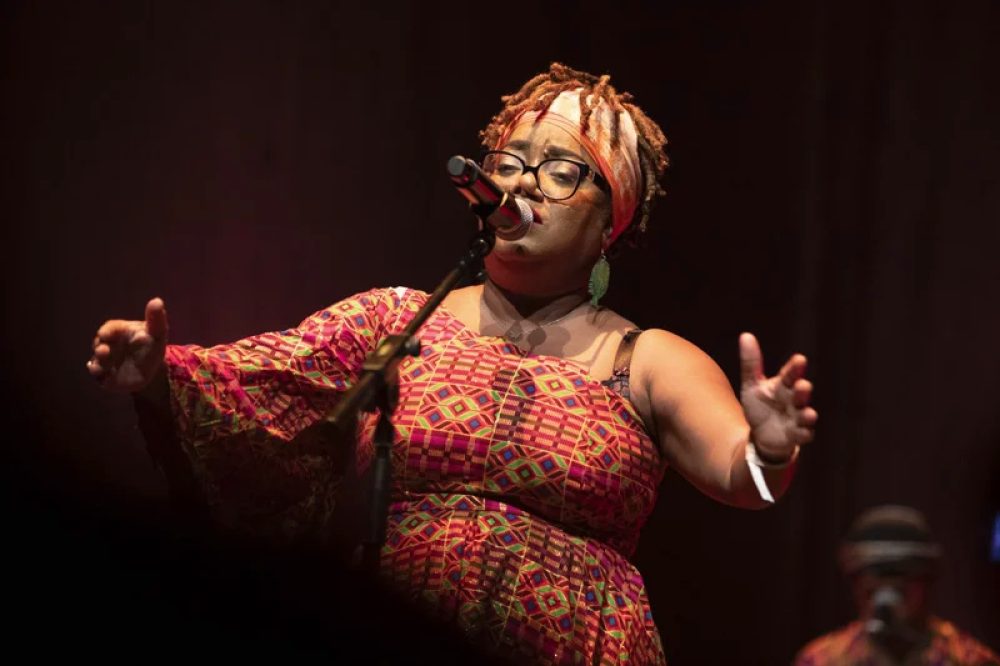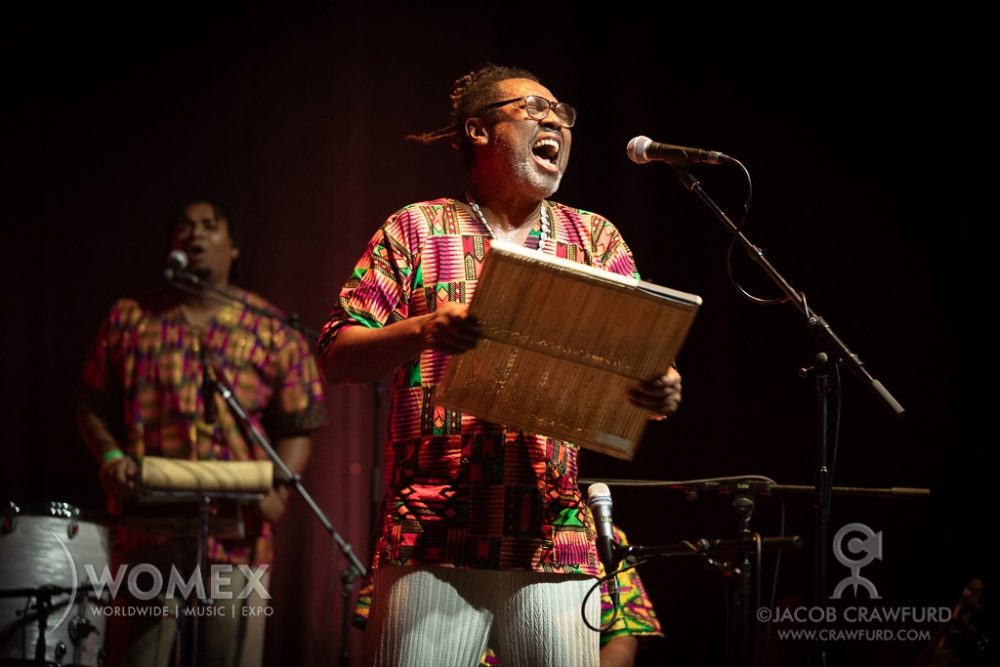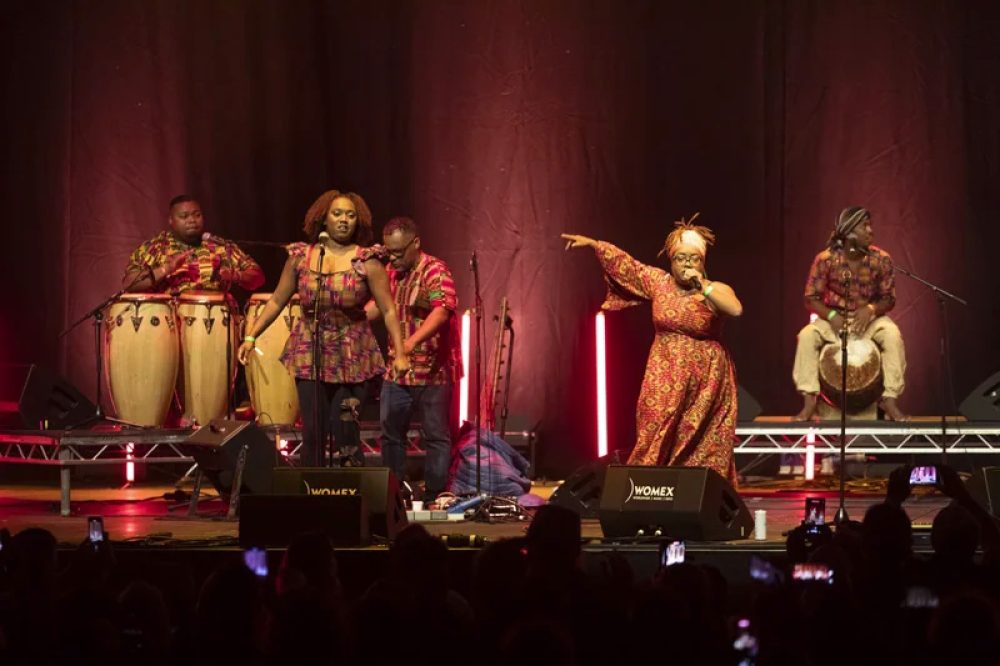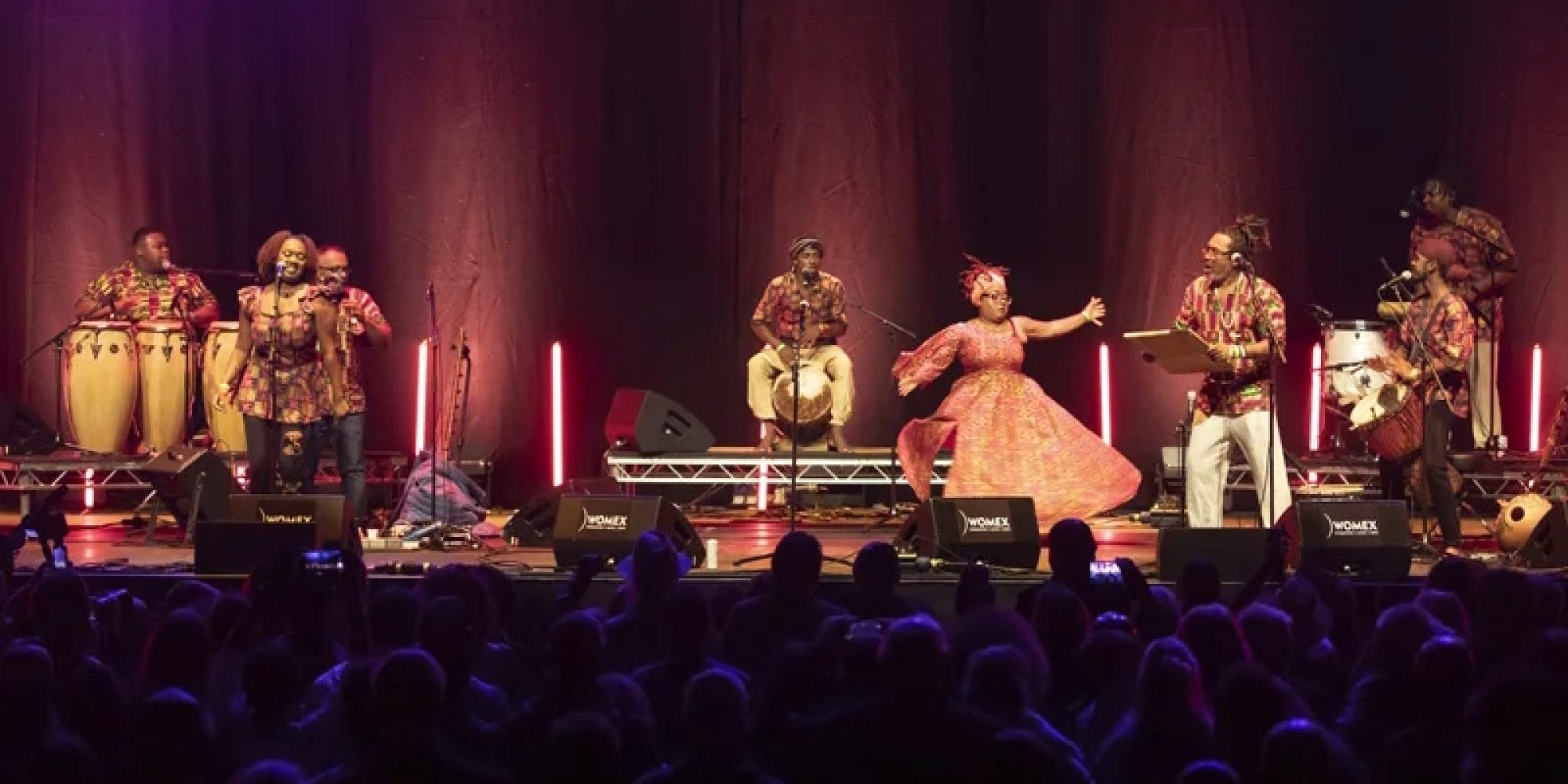All photos by Yanis Psathas
We first saw Votia at Montreal's Nuits d'Afrique back in 2018. We were thoroughly entranced by this group from Réunion Island then and hoped some day to see them again. With just their voices and percussion instruments, including the traditional kayamb (reed shaker), the audience was transported to another time and place – to the time of the “kabars,” the place where slaves, then later, former slaves, would gather and dance to the traditional maloya music of the island. These locations were a tightly held secret, as they were banned by the slave owners and then the French colonial authorities.
We were fortunate to have an opportunity to see Votia again at their WOMEX showcase last year in Manchester, England.
The family band is led by singer/songwriter Marie-Claude Lambert-Philéas, daughter of the legendary maloya musician Gramoun Lélé. When I say “family band,” I mean that the other players include Marie-Claude's husband, brother, cousin and children. Maloya, the home-grown gende of music from Réunion, is on UNESCO'S List of the Intangible Cultural Heritage of Humanity. Back in 2018, Marie-Claude explained: “It is the traditional music of Réunion. It is the music of slaves that is expressive, like the blues. It expresses your feelings, your day-to-day life, good luck and misfortunes.”
We sat down with Marie-Claude and spoke through a translator. The conversation has been edited for space and clarity.
I know your father, Gramoun Lélé, was himself a famous musician. Did he want you to do the same?
Yes. It's a family tradition. A transmission, you might say.
And are these songs mostly traditional in your repertoire?
The color and style of our music was created by my father. He brought modernity in the sense of a new way from maloya before him. So while the songs are traditional, there are also Asian influences, African influences, and influences from Madagascar that we put in too. We, ourselves, are a mix of all these influences. We play with only our traditional instruments.
I've heard the music described as “vodoun chants” and so I'm wondering if there is any connection to the vodoun tradition we see in the Caribbean and Benin?
I would say the connection is that they are both a kind of trance music, but it's also much like what is called the blues. The songs are about one's daily life, the journey, the feelings of one's day. And so at times there is a spiritual component, but other songs are just about the culture.
And what's it like to play and tour with your family?
It's easier to work with family than to work with strangers. And it was like this with my dad and now me. I learned from him. It's part of the tradition of maloya.
But you have to keep an eye on the kids, right?
Of course! [she laughs]

The history of this music has a lot to do with the island's history of colonization and that for many years it was suppressed and was illegal to perform. But now you are performing it all over the world. What does that mean to you?
It is our goal to bring maloya music to the world. To share it and for the world to hear it. The music has remained the same. It has not evolved. And now the language is protected by UNESCO. But also the instruments and the songs are protected, and we want to keep it like that.
I have to say I love the food of Réunion.
The food and the music on the island are the same thing. They give the same feeling. When you cook, you play.

Since most Western audiences don't understand the language, what kinds of feedback to you get? Do you feel that you are successfully transmitting the messages and stories?
It is through the emotion that we transmit it and then it is received, and then re-transferred back to us, even if you don't understand it. Language is a barrier, but we don't care about the words. It's the feeling. In fact, what we also have to understand, in relation to that, is the connection with the earth. In fact, maloya’s story is the earth, the slaves, the cultivation of cane – it is all a music that is connected to the earth. We ourselves, human beings, are connected to the earth. And inevitably, each human being, when he receives that, when he hears the music, he receives that connection. Maloya is a song of the earth.
The main instrument in maloya is the rouleur drum, and the base of this drum is wood. We can say it is the heartbeat. The skin of the instrument comes from dead animals, so there's a second life for the animal. With this skin we are able to make it speak again through the music. It's a cycle.
You have a new album coming out soon?
Yes. In the spring. It's called Vié Kaz which translates to “The Old House.” It is a very important place for us. The Vié Kaz was our father's house. It was a very poor house where I grew up and learned from my father, along with my 15 brothers and sisters. This song describes the place where we would all rehearse, where we started in music and why everything happened as it did. Rehearsals started at 6pm, and one never knew when it would end. This is the way the family of Gramoun Lélé, and nowadays Votia, do and live music. In this old house my father created his first album, and it is also where we rehearsed and created our albums. It's a spiritual place for us. “Vié Kaz” is also the name of one of singles we will release for this album.
I've read how the government on Réunion has been very vocal and active in trying to deal with the impact climate change is having there.
Yes. Another song on the album Zoli Péi talks about the beautiful nature of Réunion Island that gives everything you need to eat. We are an island and have little protection from climate change. We live to the rhythm of the planet – and if there is a change in the north, there is also a change in the south and we feel it. There was a time when there was local industry and it built a lot of good things. People could eat and drink and do everything, but this time is finished. It's a very difficult time now. But the island is still beautiful.
There is another song, “Volkan,” where we compare people to the volcano. “On our island there is a volcano. It rains a lot, but the volcano never dies. The volcano never goes out.” So people can talk and throw out bad energy on you, but you never die. You stay big and strong and alive. We live our lives like that volcano.
Thank you so much.
Thank you.












